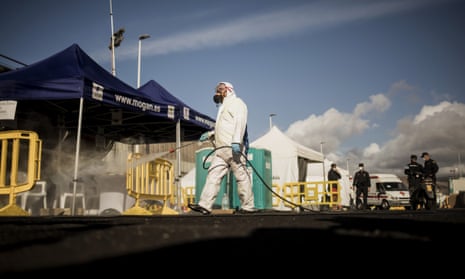Spanish authorities on the island of Gran Canaria have emptied and begun dismantling the much-criticised dockside camp that was used to house thousands of migrants and refugees, as the Canary Islands continue to struggle with a huge rise in migration.
The makeshift camp was set up in the town of Arguineguín in August amid a surge in the number of people making the dangerous Atlantic journey from Africa to Europe. So far this year, about 20,000 people have arrived by sea in the Canary Islands – 8,000 of them in November alone.
The large volume of people put the archipelago’s reception infrastructure under severe strain and had left the Arguineguín camp accommodating up to 2,600 people in cramped and unsanitary conditions.
On Friday, Spain’s public ombudsman called for the camp to be shut down at once on the grounds that it could be violating people’s basic rights. A judge described conditions in the camp as “deplorable”, while Human Rights Watch said they were “pretty awful”.
Ángel Victor Torres, the regional president of the Canaries, announced that the “unsustainable” camp had been emptied on Sunday and was being taken down.
The people accommodated there were moved to a new a camp in a former military base and to tourist hotels.
“I celebrate [the dismantling], but there’s a lot left to do,” Torres wrote on Twitter. “It’s very important that we make sure these people who have risked their lives on the dangerous Atlantic crossing receive dignified and humane treatment. There also need to be controls in their countries of origin, and we need to fight the mafias and speed up transfers and repatriations.”
The presence of the migrants and refugees had angered some residents, but Torres called for people on the archipelago to think about the islands’ own long history of migration, adding: “There’s no room for racism in the Canaries.”
The mayor of Mogán, the municipality of which Arguineguín is part, said local people’s patience was running out and that the central government needed to move the 6,000 migrants and refugees who are currently being put up in hotels before the end of the year.
Txema Santana, of the Spanish Commission for Refugee Aid, welcomed the closing of the camp but said much more needed to be done.
“EU islands can’t only be a reception area where there are thousands of places [for migrants and refugees],” he said on Monday.
“The plan for the Canaries will fail unless it includes quick, transparent and regular transfers to the Spanish mainland.”
Earlier this month, Judith Sunderland, Human Rights Watch’s acting deputy director for Europe and central Asia, visited the camp and spoke to some people who had been housed on the dock for more than two weeks.
“There are two systemic problems, which are the lack of sufficient reception spaces on the islands and then the failure of the central government to systematically, routinely, and in significant numbers, transfer people to the mainland,” she told the Guardian. “Those are two very clear solutions.”
According to the International Organization for Migration, at least 563 people have died on the Atlantic route in 2020. Eight people died last week when their boat ran into rocks as they attempted to land on Lanzarote.
The UN refugee agency, UNHCR, says the Atlantic route is having a resurgence in popularity because of enduring conflicts, land border closures due to coronavirus and increased controls in some north African countries.
